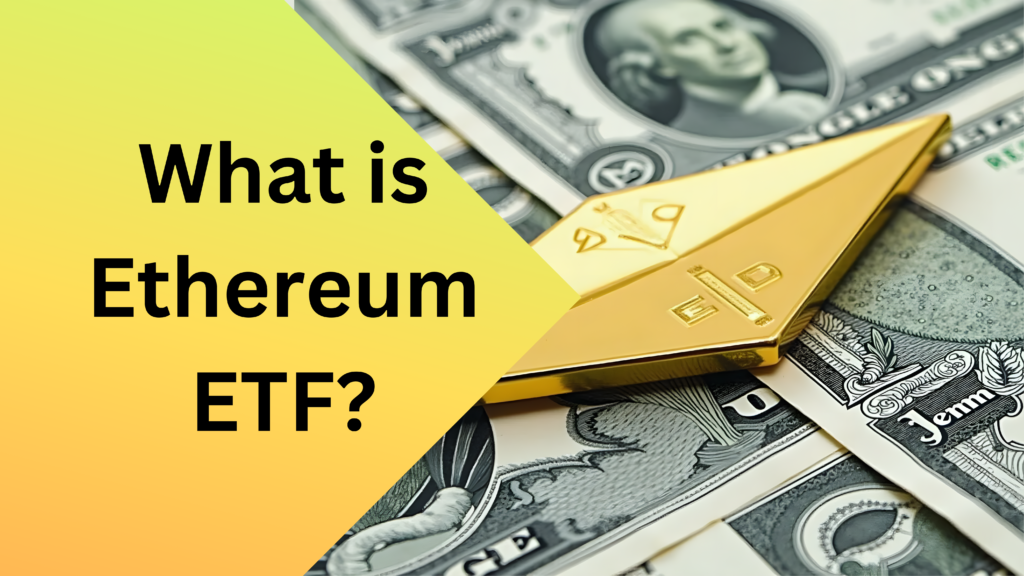Ethereum ETF Approval: How It Could Shape the Future of Crypto Investments
Eight market-based Ethereum or ether ETFs were approved by the SEC on May 23. If accepted by Nasdaq, CBOE, and NYSE, the items might begin trading later this year.
This revelation is critical for the cryptocurrency industry since it reveals that US crypto rules have altered significantly. But these ether ETFs need final approval before going live.
Which ETFs are these? Is Ethereum ETF approved? This blog will discuss the approval process when they go online, what they might mean for the Ethereum market, how regulation will change, and how to proceed.
What is Ethereum ETF?
Ethereum ETFs track Ether’s spot market price. The Ethereum blockchain uses Ether for smart contracts. These ETFs own Ether futures contracts, so buyers can buy shares that fluctuate with Ether. Some Ether ETFs hold Bitcoin and Ether futures. Since they will be traded on US stock markets, investors can obtain Ether exposure without buying and storing it. 
The Ether ETF has various benefits for buyers. Ether ETFs allow investors and corporations to easily, quickly, and safely use Ether in their portfolios because they can be acquired like stocks. This might stabilize the market, increase participation, and establish Ether as a financial tool.
Ethereum ETF Approval Date
On May 23, the SEC approved eight spot Ether ETFs for US trading. Many market experts thought that Ethereum ETFs would be turned down, so their approval came as a surprise.
Some believe the SEC’s decision was made because Trump’s crypto assistance made crypto policy an election issue. However, Bitcoin ETF approval in January certainly set a precedent that influenced the SEC’s decision.

How Ether ETFs Affect Ethereum?
Analysts are using Bitcoin ETF performance to predict Ethereum ETF performance. Many are curious if Ethereum will follow likewise. T7HSETFJ But experts say not to get too excited because Bitcoin and Ethereum are not the same. Since Bitcoin’s ETF started, fresh investors drove the price to $70,000. Ethereum’s ETF may not rise.
Ethereum ETF Approval Methods
Ether ETF approval is rigorous, showing the SEC’s caution when regulating cryptocurrencies. The process has two steps. The 19b-4 files must be approved first. Then, approve each of the eight funds’ S-1 registration petitions. The 19b-4 and S-1 paperwork had to be cleared before the Ether ETF traded. However, the 19b-4 and S-1 forms would not be accepted simultaneously. Because the plans matched Exchange Act standards to keep stock transaction information public, they were chosen.
Step 1
First, the SEC allowed eight Ether ETF issuers19b-4 forms to list spot ETFs on US platforms. This approved the initial round of applications. This phase was completed on May 23, five months after the SEC approved Bitcoin ETFs.
Exchanges propose or alter rules using 19b-4 forms. Forms submitted to the SEC for approval. These forms allow self-regulatory organizations like stock exchanges to approve rule modifications. They suggest and outline ETF form, mechanics, and operational principles. ETF value is affected by SEC approval for exchange trading.
The SEC ordered Nasdaq, NYSE, and CBOE to immediately revise 19b-4 forms to address investor protection and regulator oversight in the days leading up to the May 23 announcement.
Thus, ether ETF manufacturers were asked to resubmit 19b-4 forms with revisions that could hinder approval. All intentions to stake the token were cancelled, suggesting it was illegal.
Step 2
Every issuer must acquire their registration statement or S-1 papers accepted after the first step. The SEC requires this form for ETFs to list securities and establish up-exchange agreements following multiple rounds of contact. The legal rights of investors to information and exchange regulation to prevent fraud, market manipulation, and customer trading are the responsibilities of the SEC.
Investor protection and transparency depend on these forms. ETFs cannot trade on US exchanges or be purchased until they are made public. Candidates were instructed to revise and submit their applications by May 31.
ETF candidates must submit SEC S-1 paperwork. These forms include company information, ETF prospectuses, and investor disclosures. Financials, hazards, and business operations should be disclosed before becoming public.
Companies are now in individual disclosure discussions with the SEC. When the SEC talks to ETF issuers, the underlying ETFs are reviewed and disclosed. The government is investigating disclosure methods, but issuers’ registration statements have not been reviewed.
This reflects the Commission’s wise regulation of these vital financial products. ETF makers and SEC staff often communicate during this process. Feedback from the SEC may lead to modifications. Repeating stages may take weeks or months.
Bitcoin and Other ETFs Will Emerge in Future
The first day of spot Bitcoin ETFs was the most successful ever. In their first year, these ETFs added almost $108 billion in AUM, indicating strong demand from individual and institutional investors. Big brands like BlackRock, Fidelity, and Ark Invest helped manage Bitcoin exposure to penetrate traditional financial markets. This enabled several new crypto-ETF ideas.
After Bitcoin ETFs became successful, Ethereum ETFs gave investors access to the second-largest cryptocurrency by market valuation. Staking will likely debut in Ethereum ETFs around 2025. This function would give investors staking benefits, making these funds more enticing and useful.
It is expected that Solana and other popular crypto protocols to have ETFs soon. Its speedy blockchain, robust DeFi environment, and rapid growth in gaming, NFTs, and meme coins have made this protocol famous.
Possible releases include weighted crypto index ETFs. These give investors a broader crypto market outlook. These indices may incorporate Bitcoin, Ethereum, Solana, and other successful assets and emerging protocols. This would give buyers a well-balanced portfolio that considers ecosystem growth. These changes will make crypto investing easier, faster, and more appealing to a wider audience, attracting more money.
New Investor Access
Spot Ether ETFs are now permitted, making Ethereum easier for individual and institutional investors. These new Ethereum products, like spot Bitcoin ETFs in January, could attract additional investors who are wary of security, custody, and legal issues.
Large financial organizations may be interested in Ether ETF applications since they allow trading Ether easier without buying and protecting individual tokens. This would boost Ethereum’s revenue.
Conclusion
Ethereum ETFs have been approved by the SEC, signalling a major step toward mainstream crypto adoption. While the final regulatory steps are still in progress, this approval paves the way for greater institutional investment and market growth. If you’re asking, Is Ethereum ETF approved?, the answer is yes—setting the stage for a new era in cryptocurrency investments.




ETH
Eth
Want to be a crypto entrepreneur
*armanzsuparman8@gmail.com*
Gmail
armanzsuparman8@gmail.com*
Yess
Eu dou investidor cripto
Por favor elabore sua consulta